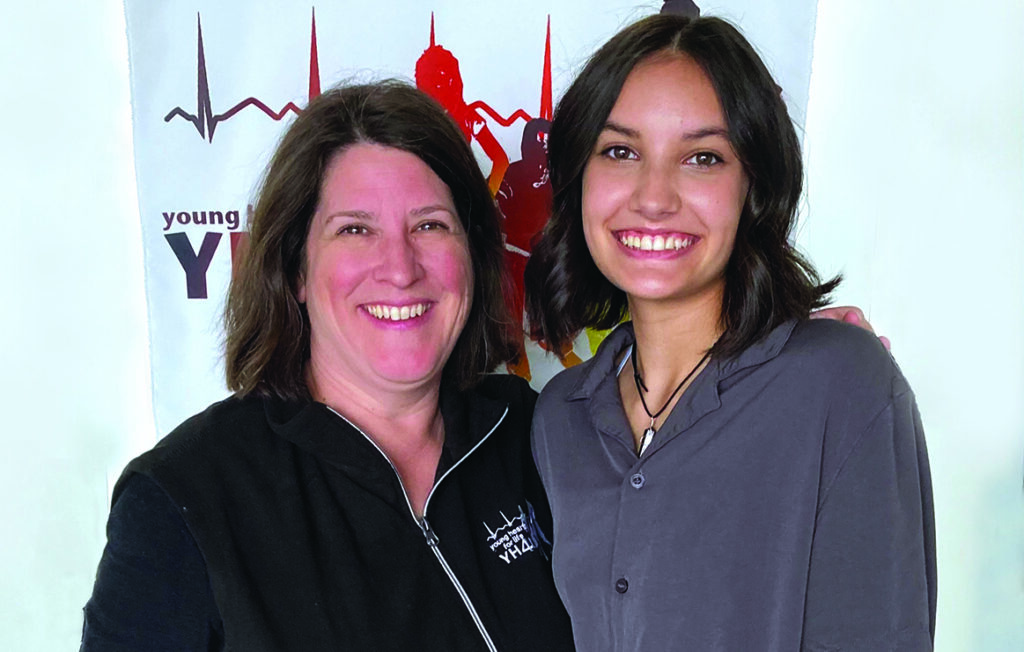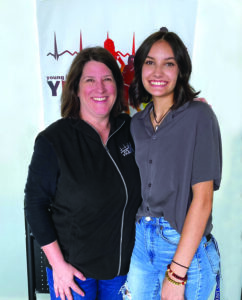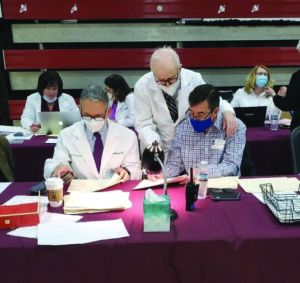Getting to the “Heart of the Matter”

Young Hearts for Life educates communities on the importance of early cardiac screening
By Cindy Maquet
In 2005, Dr. Joseph Marek, a clinical cardiologist with Advocate Heart Institute, was approached by a mother from Naperville who had recently lost her teenage son due to Sudden Cardiac Death (SCD). He had no sign of health concerns and no family history of heart problems. His first symptom was death. It was important for her to find out what could have prevented this tragedy. Dr. Marek had no answers. But coincidentally, the same week, he read two articles from the Wall Street Journal and The New York Times that discussed standard Electrocardiogram (ECG) screenings in Europe. An ECG takes less than four minutes, and this quick, simple, and painless screening could reduce SCD by 85%.

YH4L program director Denise Arnez and Emma Sarin, a college student studying nursing whose cardiac conditions was detected through a YH4L screening when she was in high school.
Dr. Marek felt called to action. These screenings were saving lives – young lives. Dr. Marek determined the best way to have the most significant impact on saving these young lives was to go where most teenagers are found at one time – school. Instead of asking teens to come to a heart screening, why not bring his team to them? Dr. Marek is the Founder and Medical Director of Young Hearts for Life (YH4L). According to Dr. Marek, “ECG screenings of all physically active young persons – regardless of gender or sports affiliation – are clinically justified, cost-effective, and ethically compelling.” Since its inception in 2006, this organization has screened over 280,000 high school students. YH4L’s mission is to offer ECGs – for free – to all teenage students. Today, it has the most extensive ECG screening program for high school students in the United States. How does YH4L screen 2,400 students during a single school day? Volunteers. YH4L has developed a training program allowing this multitude of heart screenings to be possible. It takes 90 minutes to teach volunteers how to conduct the ECG screenings.
In the past 15 years, YH4L has trained over 18,000 parents, teachers, coaches, and community members to assist with various aspects of the screening process. Those looking to help with screenings do not need a medical background to help. The screenings have saved countless lives. One life hit close to home. Emma Sarin was diagnosed with Wolff-Parkin-son-White syndrome (WPW) after a YH4L Screening at Nazareth Academy in La Grange Park. WPW is a syndrome in which an extra electrical pathway in the heart causes a rapid heartbeat. Sarin, a resident of Westmont, was a junior in high school. “Emma was the picture of health. She was very athletic and fit. She also ran track and played club volleyball,” said her mother, Deb Sarin. “Volunteering makes a difference. Someone who volunteered saved my daughter’s life.” Luckily, Y4HL identified Sarin’s condition before it became fatal. According to the Y4HL, SCD claims the lives of more than 60 young adults in the United States every week. The non-profit organization’s goal is to detect pre-existing conditions that cause SCD. To date, Y4HL has identified 3,100 students “at risk.” Many of these at-risk teens had life-threatening heart conditions after following up with cardiac doctors. Beyond offering free screenings, one of YH4L’s other core goals is to educate the community on why early cardiac screenings are essential. “Education is key,” says Denise Arnez, YH4L Program Director.

Dr. Mohamed Ziad Sinno, Dr. Joseph Marek, and Dr. Frank Zimmerman read and consult on the ECG’S during a YH4L screening.
“ECG screenings of all physically active young persons – regardless of gender or sports affiliation – are clinically justified, cost-effective, and ethically compelling.”
“A sports physical is critical. However, it only identifies 4% of heart conditions, while ECG screenings can detect approximately 70%.” In addition, YH4L has also established a bereavement support group, Gold Heart Families, connecting families who have lost a child to SCD with others who have faced the same loss. Many of these families started their organizations in honor of their loved ones afflicted with SCD and continue to work with YH4L as donors and volunteers. Although YH4L has become a leader in the local medical community in addressing the need to prevent SCD in young adults, it has also assisted organizations across the United States in setting up their screening programs. But one question remains. Free screenings are readily available to every student, but why aren’t all students taking advantage of the opportunity? Imagine not having a loved one participate in a free cardiac screening only to find out about an undetected cardiac issue too late. To view upcoming screenings, as well as to volunteer or donate to the organization, visit http://www.yh4l.org
About the writer: Cindy Maquet is a cardiac survivor. At 18 years old, an EKG detected an atrial septal defect. She has had open-heart surgery and four heart ablations. A former collegiate athlete, she continues to live an active lifestyle playing paddle ball multiple times per week and teaching various exercise classes.
*Photos courtesy of Young Hearts for Life
